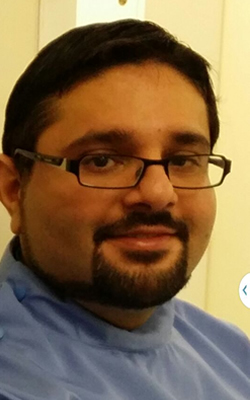Your Six Monthly Dental Examination

Dr Harminder Sehmi explains why it is important to maintain regular visits.
Whether you are young or old, you should always try to see your local dentist for an examination every six months or so. Those in a high risk group, such as diabetics (1), may need to keep these appointments more frequently to be able to keep their teeth and gums in good health.
For most people though, once every six months should be sufficient unless any problems arise in between. If this does happen, you should not wait until your next check up date, but call our Wickford practice to make an appointment to be seen by a dentist as soon as possible.
Visiting us once every six months is a small price to pay for having a healthy mouth. Anyone who has neglected to do this for a lengthy period of time will almost certainly have problems such as sore gums or toothache, and burying your head in the sand is not a good idea when it comes to your oral health!
What happens at your examination?
Whatever your appointment time is, please try to arrive at least ten minutes or so beforehand. This will give our reception team sufficient time for any paperwork (though much of this is now done digitally). Making sure that you are on time allows our dentists to see patients at their allocated times and helps to reduce any delays.
Once the ‘paperwork’ has been done, you will be called in to see one of the clinical team. Once seated in our comfortable dental chairs, we will first of all make sure that your medical records are up to date. Please do be honest with us when we ask you questions about your general health. Neglecting to tell us about a medical condition could, potentially, put you at risk if you need certain treatments. The same applies to any medications that you are on. Blood thinning medication, for example, may mean that you need to receive treatment in hospital in certain instances.
During the examination itself, we look for a number of things. Most obviously, we look for any signs that you may have tooth decay. This can be quite minor at first, but will require treatment even if this is the case. Small cavities will not ‘heal’, and, if left alone, will almost certainly become larger and may even result in a very painful tooth. If we detect any small cavities, we will ask you to arrange a treatment appointment where we can complete a small filling for you. In some cases, very minor work might be completed on the same day.
It is not just your teeth that we inspect though. Your gum health is important and we will look for any signs of gum disease which is often straightforward to reverse if detected early enough. Symptoms such as inflamed or receding gums, means that a thorough clean by one of our hygienist team is necessary to clear the teeth and gum line of any hardened bacterial deposits known as tartar. If the issues have progressed, additional treatment may be required, possibly with a dental specialist.
Finally, we will look for any possible signs of oral cancers. This is a growing problem in the UK, and especially in smokers or heavy drinkers. Signs of possible oral cancers may include the likes of lesions or red or white patches on the tongue. These can be caused by other things too, but if we do detect anything, we will refer you to your GP for further investigation. It is important to have a an additional medical check quickly so that you can receive rapid treatment should anything untoward be uncovered.
X-rays
Whilst x-rays will not be carried out at every examination, they do form an important part of your ongoing oral health care. Our dentists are able to detect most dental issues but can not see below the gum line without the use of an x-ray. These can detect problems that would otherwise go undetected in many cases, until perhaps, there is significant discomfort. Amongst problems that may be detected using an x-ray are periodontitis and root canal infections. In addition to this, and especially important where root canal treatment is needed, otherwise unseen abscesses may be detected and will require treatment.
However well you look after your teeth at home, dental problems can still easily occur. Not only are small cavities possible, especially in difficult to reach areas when you brush, but tiny cracks or chips in the teeth can also make them more vulnerable to decay, once the protective enamel has been damaged. Obviously, you do need to keep up a good home oral health regimen with regular brushing and flossing, but please also try to keep your check up appointments for your peace of mind. Our Wickford and Rayleigh patients can contact us to arrange an appointment, or change one, by calling us on 01268 733078.
If you do need to change your appointment, please give us 48 hours notice wherever possible. This will allow us to see other patients, who may be in some discomfort, a little sooner.
Dr Harminder Sehmi is a dentist at the Cygnet Dental Practice (GDC 82530)
